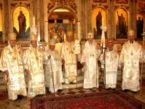Paznicul ușii
| Acest articol (sau părți din el) este propus spre traducere din limba engleză!
Dacă doriți să vă asumați acestă traducere (parțial sau integral), anunțați acest lucru pe pagina de discuții a articolului. |
| Acest articol face parte din seria Cler | |

| |
| Ordinele mari | |
| Episcop – Preot – Diacon | |
| Ordinele mici | |
| Subdiacon – Citeț Cantor – Acolit | |
| Ordine dispărute | |
| Horepiscop – Exorcist Paznicul ușii – Diaconiță | |
| Titluri episcopale | |
| Patriarh – Catolicos Arhiepiscop – Mitropolit Vicar – Titular | |
| Titluri preoțești | |
| Protopop – Paroh Protosinghel – Sachelar Iconom – Iconom stavrofor | |
| Titluri diaconale | |
| Arhidiacon Protodiacon – Ierodiacon | |
| Titluri monahale | |
| Arhimandrit Stareț – Egumen – Econom | |
| Adiacente | |
| Hirotonie – Axios Veșminte Formule de adresare Distincții bisericești Exarh – Vicar | |
| Editați această casetă | |
Paznicul uşii sau uşierul, is an extinct office within the minor orders of clergy in the Church. The doorkeeper's duty in the Early Church consisted of the opening and closing of church doors, guarding the church building proper, and ensuring that no unbaptized persons entered during the Liturgy of the Faithful.
History
Porters, during the time of the Romans, were men, usually slaves, who held the duty of guarding the entrances of homes. Most Roman homes of the upper class had an ostiarius, or doorkeeper, whose duties were usually considered inferior to that of the other house slaves.
During the times of Roman persecution of the Church when liturgies were held in the homes of the faithful, it became necessary to mimic this secular tradition. This was to guard the faithful and the Sacred Mysteries. Doorkeepers are first referred to in the letter of Pope Cornelius to Bishop Fabius of Antioch, written in 251, where it is said that in Rome there were 46 priests, seven deacons, seven subdeacons, 42 acolytes, and 52 exorcists, readers, and doorkeepers.1
According to the statement in the Liber Pontificalis, a porter named Romanus suffered martyrdom in 258 around the same time as St. Lawrence of Rome.2
References to the doorkeeper's duties still exist within the life of the Church. For example, before the recitation of the Creed, the deacon or priest says, "The Doors! The Doors! In wisdom let us attend." Traditionally, at that point in the service, any unbelievers or remaining catechumens were ushered out. This was the order given by the clergy to the doorkeeper to seal the church.
References
- Format:Note Eusebius, Historia Ecclesiastica, VI, 43. [1]
- Format:Note Liber Pontificalis, ed. Duchesne, I, 155. XXV, 3